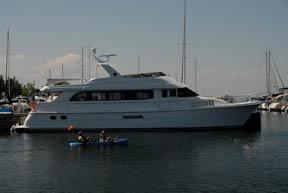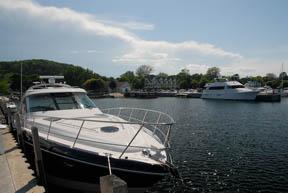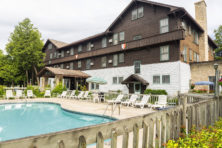Gas Prices Change Habits on Door County’s Water
- Share
- Tweet
- Pin
- Share
“Remember that man who used to come up every summer?” Robbie Leclair asks Christy Sully, both dockmasters in the Sister Bay Marina office on a busy Monday morning.

A couple enjoys a gas-free excursion in Fish Creek as they pass a yacht whose owner probably isn’t too concerned about gas prices.
“He’s not coming up this year because gas has gotten too expensive,” explains Leclair. “It was going to cost him $4,000 each way!”
Sully nods knowingly and admits it’s not the first time she has heard this kind of story.
“He’s not the only one – people’s boating habits are changing, that’s a big reason business has been down this summer at the Sister Bay Marina,” she says.
According to Leclair, gas prices have had the greatest impact on the marina’s boat launching ramp, “it’s noticeably down because middle-class boaters can’t afford gas, and they’re the ones that use the ramp most.”

Many boats like these in Fish Creek are spending more time tied to shore as owners cut back on gas usage.
Rising gas prices, coupled with a faltering economy and unstable housing market, have had an impact on boat retail and usage across the United States.
The Marine Recreational Fisheries Statistical Survey which tracks boater registration reports record low boat sales in the country, down 20.4 percent since 2007. The increasing cost of boating has caused many to speculate on the stability of the industry.
This could mean major change for Door County, where many depend largely on the boating industry and lifestyle for economic survival.
High gas prices and the housing slump has lead to a decline in boat sales nationally, and it’s having an impact on boat builders, retailers and businesses around the Great Lakes, sparking fears that local businesses in Door County could also be affected.
Fifty jobs were recently cut at the Bayliner Factory in Pipestone, Minnesota, which builds recreational boats for the Brunswick Corporation. Brunswick, a large-scale recreational boat retailer, plans to cut 2,700 more jobs and close 12 of its plants by 2010.
Boatbuilding and repairs represent one of the most prominent sectors of employment in Door County.
According to a report by the Wisconsin Department of Workforce Development, two of the largest employers in Door County are boat builders: Bay Shipbuilding, part of the larger Manitowoc Marine Group (sold Aug. 4 to Italian company Cantieri Navali Italiani S.P.A), and Palmer Johnson Yachts, both located in Sturgeon Bay.
Mike Kelsie, manager and owner of Palmer Johnson Yachts, doesn’t believe declining sales nationally will have an impact on his business. He explains that business has been “as usual” this summer for Palmer Johnson Yachts’ yacht sales.
“When you’re buying boats this big and expensive the price of gas doesn’t matter,” he said.
Eric Kordon, boat retailer for CalMarine in Sister Bay, admits business has been down this summer but does not seem worried about the long-term impact.
“We’re definitely down, but less because of the price of oil than the bad weather in June and early July,” he says. “In fact our sales have picked up the last couple of weeks.”
Rich Larsen, general manager of Yachtworks in Sister Bay, explains that their business has not been impacted because they sell “niche” boat. He admits, however, that Yachtworks is still vulnerable to larger economic factors that affect the boat retail business at large.
“This doesn’t mean we are not threatened by the impact of gas and the economy on boat sales around the country – niche boats are one thing that help us to cope,” Larsen says. “There’s no silver bullet solution here.”
The combination of high gas prices and tight wallets means people may not only be hesitating about buying a boat these days, but also about using one.
The high cost of gas is the driving reason why boating use is down this summer in places like Door County and other parts of the state. In Brown County, daily launches were reported to be down 16 percent this year.
Gas prices have risen 37 percent in the last year, according to the Energy Information Administration, and there’s little reason to believe we won’t see further spikes in the years to come.
“A lot of our customers complain about the gas prices, especially since many of them are retired with a fixed income,” says Sully, who’s been working for the Village of Sister Bay since 1991 and at the marina for the past two years. “Some of them weren’t able to come up this summer and a lot of them have changed the way they boat. They stay in their slips a lot more and take shorter trips than before.”
Zack Lozoff, who’s been boating on a weekly basis during the summer for the past two years, is all too aware of the escalating price of gas when he takes his friend’s 21-foot Thompson powerboat out: “We split the gas between friends; last summer it was 10 to 15 dollars a person but now it’s 20 or 25.”
Sully says she hears boaters complain on a daily basis at the Sister Bay Marina about the price of gas, and laughs at the new ways they have found to cut the cost of being on the water.
She says many boaters are just changing their boating habits rather than giving up on the sport altogether, traveling shorter distances or spending less time with their foot on the gas pedal.
“This one guy runs at low speed all the way down to Chicago to save gas,” Sully explains. “It takes him 10 hours.”

